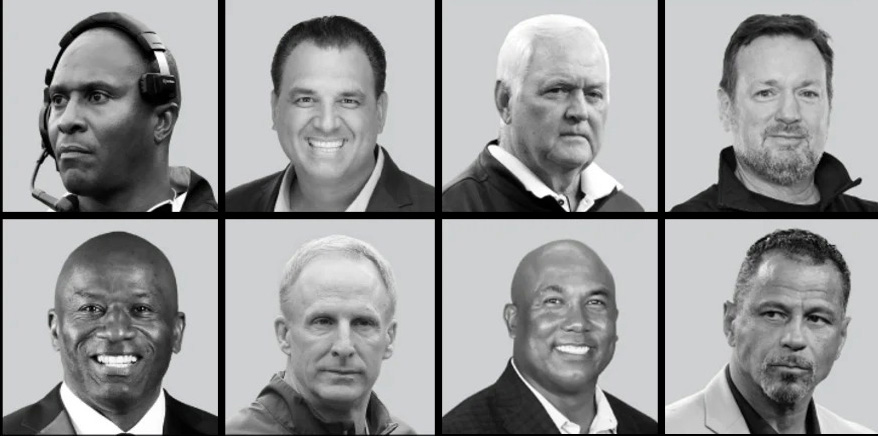
In 2001, the XFL had two black head coaches among its eight franchises, or 25% of its head coaches. In the NFL season previous to that, of 30 teams, there were two full-time head coaches of color, making up less than seven percent of the league. The 2020 XFL season had three black head coaches of eight; that would be 37.5%. The 2019 NFL season saw four minority coaches of 32, for just 12.5%.
On Wednesday, the XFL announced its slate of eight head coaches for its third season. Four of the eight (an even 50%) are African-American. To begin the 2021 season, five of the 32 NFL head coaches were minorities – 15.6%. Small sample sizes aside, the XFL has always been ahead of the curve in providing opportunities to Black head coaches, in increasing percentages with each reboot; these are opportunities that don’t always seem to be available at the highest level of professional football.
There’s more to it than simply numbers, though. If you look at the coaching experience of XFL head coaches by race, the results are startling: The White head coaches have 114 years of experience among the four (just Wade Phillips, Bob Stoops and Jim Haslett alone have 113 years), including 34 years as a head coach at either the college or pro level. Contrast that with the four Black head coaches, who collectively have 38 years of coaching experience and just 14 as head coach – all of those years belonging to Reggie Barlow.
The NFL’s lack of diversity among its head coaches is not a new story; The Rooney Rule was instituted in 2002 in the hopes of addressing the issue. It required teams to interview at least one minority candidate for head coaching openings. The Rule has not had its intended effect, to the point that it has since been modified to require teams to now interview two minority candidates for head coaching positions, as well as one for coordinator openings. The NFL is so desperate for teams to increase its minority presence in front offices that if a team loses a person of color to another team for the position of head coach or general manager, the team they were hired from is rewarded with a third-round compensatory pick in the following draft.
A study from the Institute for Diversity and Ethics in Sports at the University of Central Florida showed that in 2021, over 70% of the players in the NFL were persons of color. That makes the lack of diversity in positions of power in the league all the more damning: The percentage of NFL assistant coaches who are African-American fluctuates between 35-40% depending on the year. African-American general managers make up 16% of the league; there are only two Black team presidents.
Former Miami Dolphins head coach Brian Flores’s lawsuit against his ex-employer, the NFL, and others has laid bare the issues with NFL’s hiring practices in stark detail. Flores and others who have since joined the suit, Ray Horton and Steve Wilks, describe a sham process whereby Black coaches are only interviewed to satisfy the Rooney Rule, rarely given a fair shake.
The XFL will not have that problem. Dany Garcia, born to Cuban parents, and Dwayne Johnson, whose father was Black and mother Samoan, have made diversity and inclusion a big part of what they want to do with the league. In an SI.com interview shortly after purchasing the XFL out of bankruptcy, Garcia said she wanted to surround herself with “…people who want to do good, who are looking for diversity and inclusion. That’s extremely important.”
From an ESPN.com piece in August of 2020, “Garcia said that diversity and inclusion will be ‘a relevant and accountable conversation’ through the league…’we will have the best people in the best positions, and it will be diverse and inclusive and that’s how it should be.'”
The word “inclusivity” appears as one of the XFL’s four brand pillars as revealed two weeks ago. In its description, the word “opportunities” is also used. For several coaches of color, being a part of the XFL is an opportunity they may not otherwise have been afforded.
Rod Woodson played in the NFL for 17 years and is a member of both the College Football Hall of Fame as well as the NFL Hall of Fame. He went to 11 Pro Bowls as a player, is a Super Bowl champion, an NFL Defensive Player of the Year, and six times was an NFL All-Pro. Yet his coaching history does not match his pedigree between the lines. He was twice a coaching intern on the Bill Walsh Minority Coaching Fellowship Program – once even after he was a cornerbacks coach for a season. He spent two years as assistant defensive backs coach and two years as a defensive backs coach in the NFL. After the 2017 regular season, he was let go by the Raiders when they hired Jon Gruden as their head coach. This past season, Gruden was fired when e-mails came to light in which he used racist and homophobic language.
Terrell Buckley played in the NFL for 14 years and is a member of the College Football Hall of Fame. He was a first round draft pick (fifth overall) in 1992 and won a Super Bowl with the New England Patriots. He recorded over 50 interceptions in his career from the defensive back position. His coaching career has been dotted with minor assistant jobs, such as safeties and wide receivers assistant, weight room coach, and graduate assistant – the latter after he had already been an assistant position coach. He never rose above position coach at the college level before he was hired from his job at Ole Miss to come to the XFL.
Hines Ward played in the NFL for 14 years and for the last six years has been a semifinalist for the NFL Hall of Fame. He is a two-time Super Bowl champion and one-time Super Bowl MVP. He made the Pro Bowl four times during his illustrious career, in which he finished with exactly 1,000 career receptions. Ward spent two years as an offensive assistant with the New York Jets and had just finished his first year as wide receivers coach with Florida Atlantic University when the XFL came calling. Prior to the XFL, however, Ward interviewed for the head coaching job with the Houston Texans in January. He was the second minority candidate to interview with the Texans, thus satisfying the Rooney Rule.
Reggie Barlow played in the NFL for seven years and won a Super Bowl with the Tampa Bay Buccaneers. He was a Pro Bowl alternate in 1998 after leading the league in punt return yardage. He became a quarterbacks coach at Alabama State in 2005, where he mentored future NFL quarterback Tarvaris Jackson. He was promoted to head coach in 2007, where he served for eight years. A contract dispute led to Barlow’s departure from the college after the 2014 season. He took the reigns of Virginia State in 2016 where he coached for five more seasons. Barlow won two Black College National Championships, one at each school, as head coach. In 2022, Barlow was a part of the first-ever Reese’s Senior Bowl minority coaching fellowship program, where HBCU coaches selected would join the coaching staffs of the NFL teams chosen to lead the Senior Bowl teams, “to connect HBCU coaches with NFL decision-makers in hope that it leads to future career opportunities.”
While pro success does not necessarily guarantee someone the right to rise up the coaching ranks, nor does it make someone an effective coach, it’s difficult to believe these particular men couldn’t be an asset to a coaching staff somewhere in either the pro or college game. The fire to coach, to be a leader of men, clearly still burns as they’ve accepted jobs with the XFL. A few may come in with chips on their shoulder, ready to prove wrong those who passed them over.
Perhaps one day, the NFL won’t need a Bill Walsh Minority Fellowship Coaching Program. Or a fellowship for HBCU coaches at an all-star game. Or the Rooney Rule. Or even a league like the XFL to raise up the profile of minority coaches. Gruden’s e-mails and Flores’s lawsuit have taught us the NFL has a long way to go, despite the mechanisms in place, to put minority coaches on even footing with their peers. The XFL, however, will have no such problem; those opportunities, the striving for diversity, are baked into the DNA of ownership and the league itself.













